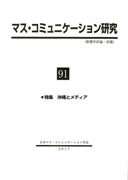91 巻
選択された号の論文の21件中1~21を表示しています
- |<
- <
- 1
- >
- >|
■特集 沖縄とメディア
-
2017 年 91 巻 p. 3-21
発行日: 2017/07/31
公開日: 2017/11/07
PDF形式でダウンロード (1564K) -
2017 年 91 巻 p. 23-40
発行日: 2017/07/31
公開日: 2017/11/07
PDF形式でダウンロード (1559K) -
2017 年 91 巻 p. 41-50
発行日: 2017/07/31
公開日: 2017/11/07
PDF形式でダウンロード (1535K) -
2017 年 91 巻 p. 51-63
発行日: 2017/07/31
公開日: 2017/11/07
PDF形式でダウンロード (1544K) -
2017 年 91 巻 p. 65-79
発行日: 2017/07/31
公開日: 2017/11/07
PDF形式でダウンロード (1548K)
■論文
-
2017 年 91 巻 p. 83-102
発行日: 2017/07/31
公開日: 2017/11/07
PDF形式でダウンロード (1645K) -
2017 年 91 巻 p. 103-121
発行日: 2017/07/31
公開日: 2017/11/07
PDF形式でダウンロード (1562K) -
2017 年 91 巻 p. 123-141
発行日: 2017/07/31
公開日: 2017/11/07
PDF形式でダウンロード (1568K)
■2016年度秋季研究発表会 ワークショップ報告
-
2017 年 91 巻 p. 143-144
発行日: 2017/07/31
公開日: 2017/11/07
PDF形式でダウンロード (1509K) -
2017 年 91 巻 p. 145-146
発行日: 2017/07/31
公開日: 2017/11/07
PDF形式でダウンロード (1477K) -
2017 年 91 巻 p. 147-148
発行日: 2017/07/31
公開日: 2017/11/07
PDF形式でダウンロード (1475K) -
2017 年 91 巻 p. 149-150
発行日: 2017/07/31
公開日: 2017/11/07
PDF形式でダウンロード (1478K) -
2017 年 91 巻 p. 151-152
発行日: 2017/07/31
公開日: 2017/11/07
PDF形式でダウンロード (1474K) -
2017 年 91 巻 p. 153-155
発行日: 2017/07/31
公開日: 2017/11/07
PDF形式でダウンロード (1479K) -
2017 年 91 巻 p. 156-157
発行日: 2017/07/31
公開日: 2017/11/07
PDF形式でダウンロード (1477K) -
2017 年 91 巻 p. 158-159
発行日: 2017/07/31
公開日: 2017/11/07
PDF形式でダウンロード (1476K) -
2017 年 91 巻 p. 160-161
発行日: 2017/07/31
公開日: 2017/11/07
PDF形式でダウンロード (1477K) -
2017 年 91 巻 p. 162-163
発行日: 2017/07/31
公開日: 2017/11/07
PDF形式でダウンロード (1479K)
■研究会の記録(2016年10月~2017年2月)
-
2017 年 91 巻 p. 164-166
発行日: 2017/07/31
公開日: 2017/11/07
PDF形式でダウンロード (1481K) -
2017 年 91 巻 p. 167-168
発行日: 2017/07/31
公開日: 2017/11/07
PDF形式でダウンロード (1481K) -
2017 年 91 巻 p. 169-172
発行日: 2017/07/31
公開日: 2017/11/07
PDF形式でダウンロード (1484K)
- |<
- <
- 1
- >
- >|
